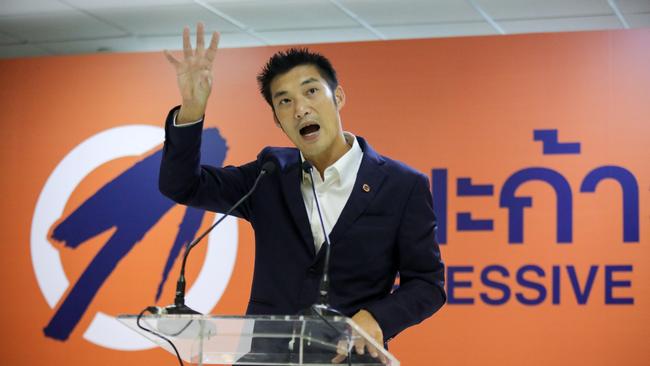Thailand too close to China, says reformer
Thanathorn Juangroongruangkit says the country must restore its democracy and end laws that criminalise insulting the king.

Thanathorn Juangroongruangkit is banned from political life though you wouldn’t know it from his campaigning ahead of Thailand’s elections next month for the restoration of democracy, reform of the military, the monarchy, and a review of the US ally’s China-centric positioning.
“This government, military junta, has brought Thailand too close to China – politically, economically, diplomatically,” the 43-year-old founder of the disbanded Future Forward party tells The Australian in between rallies for its successor, Move Forward.
“Thailand was one of a few nations to vote against the condemnation of Russia in the UN three months ago and that was very upsetting for Thai citizens. I believe a democratic Thailand is better for the world.”
Move Forward is the only major party contesting the May 14 elections to tackle the prickly China issue, to promise reform of the military-drafted constitution and of lese majeste laws which punish any perceived insult to the royal family with up to 15 years’ jail.
The party says it is on course to capture the second highest number of votes behind exiled former prime minister Thaksin Shinawatra’s Pheu Thai, setting the stage for ferocious backroom deals over governing coalition alignments.
Explaining the need for what older or rural Thais might see as radical reforms – the king is considered almost god-like by many – requires “patience”, admits Mr Thanathorn, but the party must broaden its base. “Let’s be honest, Thailand needs many reforms, some of which may be politically unpopular but necessary – like reform of the military, reform of the monarchy (which controls huge amounts of the country’s wealth), decentralisation of government. If existing political parties had the political will to do this we would not need to exist.”
The charismatic scion of a car parts manufacturing dynasty, burst onto Thailand’s moribund political stage in 2018 as head of the youth-based FFP, demanding a return to democracy five years after the last coup. The party attracted six million votes in polls the following year, third highest behind Pheu Thai and Prayuth Chan-Ocha’s Palang Pracharat party which formed government with the support of 250 military-appointed senators.
But Future Forward was a threat to the established centres of power – the military, the monarchy and its cronies – and was disbanded by the courts in February 2020 over a 191.2 million baht ($9.1m) payment Mr Thanathorn insists was a loan but the courts ruled it was an illegal political donation. Its dissolution triggered mass protests against the government and monarchy that only subsided after a state of emergency was imposed.
Mr Thanathorn was banned from holding political office for a decade. He now campaigns as the head of the Progressive Movement provincial reform group, aligned with Move Forward.
He says he has lost count of the charges against him, including one under lese majeste laws for criticising the government’s over-reliance on a firm owned by King Maha Vajiralongkorn to supply Covid-19 vaccines.
Still, he insists, this is no time to sit out the fight. “Thailand is at a cross roads. The future of the country depends on the result of these elections and on the decisions made by the leadership of the major political parties. Will there be military parties involved in governing coalitions? Do we want to face the difficult problem of amending the constitution?”
Mr Thanathorn says opposition parties could capture between 330 and 350 of 500 parliamentary seats, paving the way for a progressive coalition government to scrap the military-drafted constitution.
For that to happen, however, frontrunner “Pheu Thai would have to be brave, join with like-minded parties and stand firm against the junta”. “Pheu Thai has said we are keeping all opportunities on the table but for us it’s very clear; any military party is a no-no.”
Even if Pheu Thai was to spurn military proxies for a progressive coalition there is still the risk a desperate military could move to dissolve Pheu Thai and Move Forward, or stage another coup. There have been 12 since 1932 when Thailand shifted from an absolute monarchy to constitutional monarchy.
“I hope that would not happen because it would lead to chaos. People will resist. I think they underestimate the anger of the people,” says Thanathorn.
Like Pheu Thai’s Paetongtarn Shinawatra – Thaksin’s heavily-pregnant daughter leading his party’s campaign – he believes Thai voters have moved beyond the pro-democracy red shirts versus pro-establishment yellow shirts polarisation. “People as a whole are united against the junta now. They’re smarter. You can’t divide them anymore.”




To join the conversation, please log in. Don't have an account? Register
Join the conversation, you are commenting as Logout